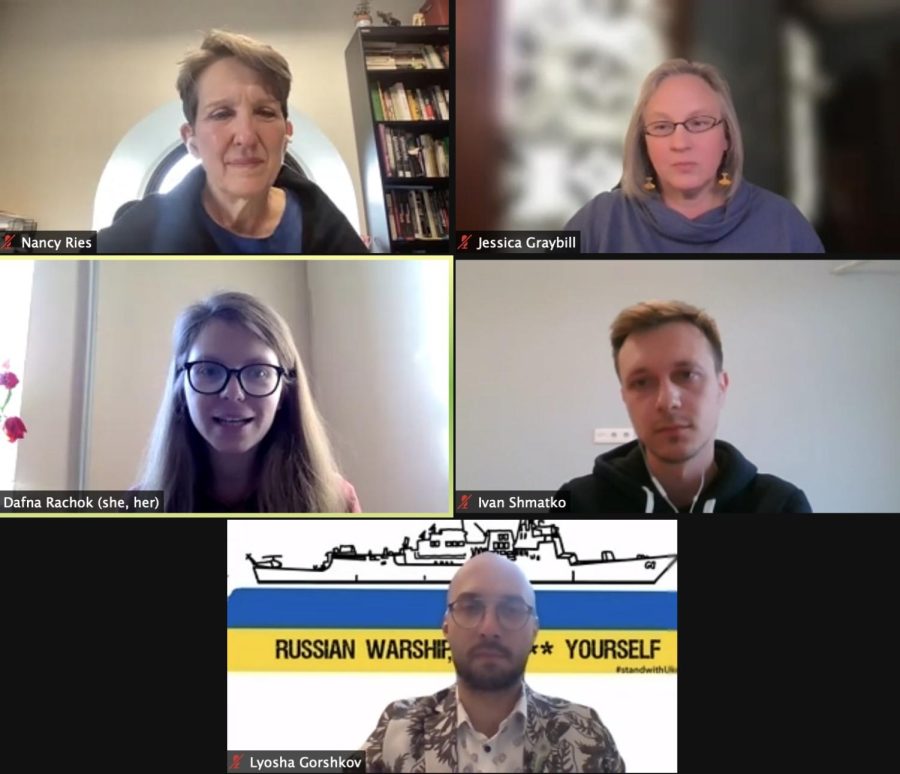Researchers Turned Volunteers Give Talk on Russian-Ukrainian War
In continuation of a semester-long effort to bring focus to Russia’s war on Ukraine, Colgate recently brought in two Ph.D. students, Dafna Rachok and Ivan Shmatko, to discuss their hands-on experience in support of Ukraine. During their talk that took place on Zoom this past Tuesday, April 26, Rachok and Shmatko discussed the difficulties they have faced in transitioning from researchers to volunteers in the war effort.
The two began by discussing how they woke up to the sound of explosions on February 24, and how quickly their volunteering began. It began with support via the internet and helping friends who were forced to relocate. They eventually heard from a friend, who was a part of the voluntary defense forces, that there was a significant lack of weapons, bulletproof vests, helmets, medical kits and other necessities in Ukraine.
Rachok and Shmatko immediately began to furnish protective gear and emergency medical supplies for Ukrainian territorial defense personnel. Their network grew quickly through word of mouth and soon they were receiving many calls requesting a variety of items. They were helping not only the army and territorial defense forces but also civilians who needed medical supplies or food.
Nancy Ries, a professor of anthropology, was able to connect with Rachok and Shmatko through co-editing a series of essays on the war for The Society of Cultural Anthropology, an organization under the American Anthropological Association umbrella, and a colleague suggested that Rachok and Shmatko might be interested in writing something.
“We put out two batches of these small essays but they were way too busy in the start of the war to write, but then were able to find time and mental space to write about their experience,” Ries said. “From then on, I’ve sent them funds myself for their work and coordinated sending funds from other people in the U.S. who want to help in these direct kinds of ways, via trusted people like Ivan and Dafna. It’s been a real inspiration reading about their work via social media and having a chance to bring them to talk with us at Colgate.”
The talk was facilitated by multiple members of Colgate faculty, and Lyosha Gorshkov, director of LGBTQ+ Initiatives, asked Rachok and Shmatko why they think that the world needs to understand that this war is important beyond the borders of Ukraine.
In response, Rachok discussed how as engaged citizens, it is important to worry about all violence and conflicts. According to Rachok, it is unfortunate that some conflicts get more media attention than others, but it is important to care about all of them given the implications of the conflict on the surrounding area. In Ukraine, the war has brought attention to the overlooked imperial and colonial sentiments that are occurring in Russia, and makes us rethink the place of imperialism and colonialism in the 21st century.
Shmatko responded by discussing how this war has shown how authoritarianism affects the world. Russia is one of the biggest supporters of authoritarian regimes, and we have seen a pattern in world politics when Russia invades another country and leaves behind ruined cities. Furthermore, Shmatko spoke about Ukraine as a main exporter of food products to the Middle East and Africa through the Black Sea, which Russia is currently blocking off. This will cause a lot of hunger and poverty that we should worry about around the world.
Gorshkov thought that the webinar went well, and was happy to see so many students in attendance.
“These conversations, especially with people on the ground, from the battlefield, are crucial for they provide not only the context of the war, but show the face of the war,” Gorshkov said. “The faces of those who, despite the imminent danger, keep fighting for their communities, their land and their people. This is emotional, this is educational and this is therapeutic — as one of the panelists pointed out. We should stay informed and do everything in our power to help Ukranians.”
Junior Phoebe Metzger-Levitt also attended the event, and appreciated that the webinar gave a platform to people who are on the ground in Ukraine.
“Not only are they volunteers supporting the Ukrainian Armed Forces and Ukrainian civilians, but they are from Ukraine, not foreign humanitarian workers. Hearing from these two graduate students provided a window into the daily realities in Ukraine as the country fights for its existence. Our news feeds are often inundated with articles about world leaders meeting to discuss solutions to problems that can seem extremely complicated and far removed from individuals. However, Dafna and Ivan are in the thick of resistance, making a tangible difference in the war effort through their own initiative,” Metzger-Levitt said.
Jessica Graybill, associate professor of Russian and Eurasian studies; director of the Russian and Eurasian studies program, provided an introduction to the event and was grateful for the time that Rachok and Shmatko spent with Colgate.
“I think that it’s critical that we hear from Ukrainians about this war,” Graybill said.“Dafna Rachok and Ivan Shmatko provided us with important insights into the impacts of war on people’s lives, including their own. We are lucky that they had the time to share with us today when they took a break from their important work of networking and providing supplies to Ukrainian civilians as they fight the Russian army.”
Ries, who has been closely following the war since February 24, discussed that despite the distance we may have from the war physically, there is still an effect on our psyche during a time like this and it can be moving to have the opportunity to hear from people who are so close to the issue.




